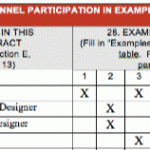
So, you are reading an RFP that makes no sense. In one section, it tells you to do one thing. But in another section, it tells you something completely different.
Oh, well! Just submit it in the most logical way, right?
WRONG!
RFPs commonly need clarification. That’s why there is a question and answer period.
Whenever you read language that you even suspect might be contradictory or needs clarification, it is your obligation to ask a question.
Never, ever, hesitate to ask a question (unless the wrong answer puts you in an unwinnable position).
What If Their Answer Clarifies Nothing?
Don’t you hate this? The RFP says, “Deliver the package to the front store.”
So you submit this question:
Page two says, “Deliver the package to the front store.” Yet there is no store at the address listed. Did you mean “front door? What further clarification can you provide on where the proposal is to be delivered?
Then they respond:
“Refer to page two for delivery directions.”
Arrrrg!!!
Sometimes clients don’t want to clarify for reasons only they could know. But other times they might not realize (or even believe) there was such crazy language in their RFP.
If you have time, ask another question (i.e. try again). If it is permissible, give them a call.
Even if it is too late to ask more questions, all is not lost.
Did You Miss Something?
Re-read every bit of that RFP. Maybe a combination of language contained in various parts of the RFP will help you paint a picture of what you need to do.
Get a Second Opinion
RFP language can sometimes be ambiguous, meaning it has multiple interpretations. Get someone new to read the RFP and give their interpretation.
I can’t count the times another person’s interpretation helped clarify RFP language for me.
How Can You Do Both?
When in doubt, find a way to do both. The classic example is an RFP that tells you to structure your proposal in two different ways. Many times, you can structure your proposal to meet both requirements.
If the RFP asks you to put resumes in section two and section seven, put them in both.
As I always say, the world of proposals and RFPs is not dictated by logic. When you can’t get clarification, do them both.
Key Takeaway: Don’t hesitate to ask for clarification. If you can’t get clarification or help from others, find a way to meet both requirements.
If you liked this article, please subscribe below or on the top of the homepage. If you want to give us your thoughts on this issue, please leave a comment below.





Dear Matt:
Many thanks for another timely and insightful blog. I beg to differ with your advice to always ask questions.
If we are in a superior position of knowledge or insight compared to other bidders, we never ask a question that educates a competitor. Recently, as an incumbent on a State contract, I had the circumstance of the purchasing agent asking those assembled at a pre-bid meeting if there were questions. Despite the complexity and ambiguity of the bid, there were none for this reason.
We had superior knowledge, both as incumbent and based on our regular interaction with the agency on behalf of private sector clients. I intended to stay silent, so as not to reveal anything about my perceived advantage. I knew the purchasing agent personally and have for years. Still she surprised.me.
What happened is that the purchasing agent directed herself to me, personally. “Mark, certainly you have some questions. Please ask us.” My flip and from the hip response was: ” Of course I have many questions. I will have to guess at their answers. This is because I have none that I wish to ask in front of our competitors.” Everyone cracked up, but I was being sincere.
Later, I did ask a question about one of the administrative terms of payment that was blatantly contradictory. My friend the purchasing agent was satisfied that I had actively participated in the pre-bid meeting, and my competitive instincts were satisfied that I had divulged nothing material to the competition. And yes, we did win.
Wise attendees at pre-bid meetings lessen attentively and ask nothing, unless the question might go directly to a go-vs-nogo decision on even bidding. The only upside to being the squeaky wheel at a pre-bid meeting is if your intention is to be a subconsultant. In such a circumstance, voicing questions gets one noticed, and can stimulate conversations about teaming. Even then, discretion rules in my opinion.
Look over my article again. I think you misread it.
If you think asking a question gives someone a leg up over you, don’t ask it. I even say that in my book.
But let me address something else. We have to be very careful about following the rules in this environment.
It’s fine to ask a private question…if that’s allowed. But if it’s not, you are really hanging out there.
And if you make a decision to break the rules, treat it like robbing a bank. Don’t tell anyone else. And try not to post it on the internets!
Confusing requirements and refusal to provide clarification is a big warning sign that you are only in the RFP to round out the field. Sometimes it’s better to cut your losses.
R,
That’s not always true. I would be careful with that.
Of course, I’m not saying bail the second you have confusing requirements or unhelpful responses–although if everyone did that, maybe RFP’s would become a little easier. 😉
Sometimes the answers will slay you, but you’ll get through it. At one point, every RFP from a very large agency would instruct that you use type that is 8 letters per inch (a measure used when we had typewriters, and impossible to meet when you are using modern typefaces for which each letter has a different space). No matter how many times the question was asked, they repeated the RFP. Truth is, the contracting officer doesn’t have the authority to change things in the RFP, and they knew it made no sense but had to follow the RFP as sole guidance. We would enclose a sheet on the top of the proposal with our chosen typeface, and a demonstration of our meeting the requirement (several long words used in the proposal, which are 8 characters per inch, with an inch measure drawn underneath, and the language, page and line from the RFP). These will generally prevent the clerk assigned to check the proposals for basic compliance (and sometimes told to get rid of as many as possible) from throwing ours out. In another example, every RFP required a section on asbestos, no matter what the RFP was about. It was silly and unnecessary, and made the agency look stupid. The backstory is that someone now very senior had once made the mistake of not asking about asbestos remediation, and when asbestos turned up at the site, the contractor had no idea that it needed special handling and it was mishandled. So, ever since, every RFP required that everyone explain how they handle asbestos remediation.
Laura,
Great story, as always!